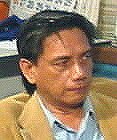For the greed for
money, corruption persists
 By CHITO DELA TORRE
By CHITO DELA TORRE
October
28, 2010
Money was powerful
last Monday. It made the highest giver the much-sought for victory in
the October 25, 2010 barangay elections. It could have been powerless
as to sway votes if it wasn’t given.
Of course, many did
not join those who went to the house of Mr./Mrs. Punong Barangay
Incumbent to receive between P100 and P500 that the re-electionist
village chief was giving each voter who appeared in a list on which
the recipient would affix “a” signature to vouchsafe that the cash
election bribe was actually received. Congressman/Congresswoman X/W,
who gave at least P83,000 for every complete line-up of candidates for
elective barangay positions, was actually not interested to look into
that list, although he/she at first wanted to know why the incumbent
first kagawad was not in the line-up submitted.
Kagawad candidates who
gave P20 or P50 per voter did not, of course, reveal that the cash
bribe came from X/W, although voters in their community knew there was
much money to flood with.
Few, however, won
without bribing voters.
Between these two
dimensions, so clear are two lessons: first, if no politician would
support any candidate with election money, no candidate would dare
spend more than his or her own financial capability; and second, if
not candidate would give out cash, no voter would ask for it. In both
lessons, elections could still push through, and winners could still
be proclaimed.
Apart from this
election offense that is known most popularly as vote-buying, another
election offense was committed rather in a manner as if to insult the
board of election tellers, the election laws, and democracy itself.
One candidate for kagawad used the line of voters as a strategy: each
time she reached the
BET’s table, she would not declare her intention to vote but would instead
rejoin the new line from the tail-end, and repeat her condemnable act
of asking voters in the line to vote for her or look through the
window to find out what voters inside the voting precinct were writing
on their ballots.
Hours before the
election, non-resident registered voters dined and slept with a
candidate whose family were prompted to render them “extra” service.
A few minutes to voting time, they walked to another candidate and
received P300 each from the latter, then cast their votes. By past 9
p.m., the P300-giver won by a large margin.
These were reports
reaching the media, but the media could not do so much about them.
* * * * * * * * * *
Media practitioners
should beware of a media photographer who might mingle with them. The
subject recently threatened to castigate a media man taller and bigger
than his size, after the latter reportedly released to the media
audience an awkward thing that he did that displeased a government
official. This same guy is already known to show himself off as a
toughie, and would sometimes bully media reporters by shouting to
their scare. Apparently, he has no respect for others and his
wrongdoings tend to vitiate the passivity of true-bloodied media
personnel in the Waray Region. He is one who does not deserve to stay
any minute longer in the private, much less the government, media.
Government and
respectable private entities should also beware of this media
photographer. Often, without any courtesy and even without being
invited, he just barges in to try to impress others that he already is
SOMEBODY.
Indeed, there are bad
eggs who fell into the media basket.
Less than half a
decade ago, a media reporter wildly spread a false report that a
fellow reporter was receiving cash from a lady governor. That false
feed besmirched the image of the media, particularly in the place
where the victim reporter was performing his reportorial functions.
An upcoming newsman, in another instance, was forced to file a libel
case against one reporter who created a lie that almost isolated the
former as one among the enemy targets of the military. The root cause
of both instances had been BIG MONEY, which divides media personnel
and deplorably and unfairly downgrades the personality of the innocent
among them.
These are shades of
a corrupt society. Everyone should hope that the PNoy regime can cut
this off even as it is crusading on a campaign promise to unveil the
truths about institutionalized and minuscule corruption in the
Philippines.